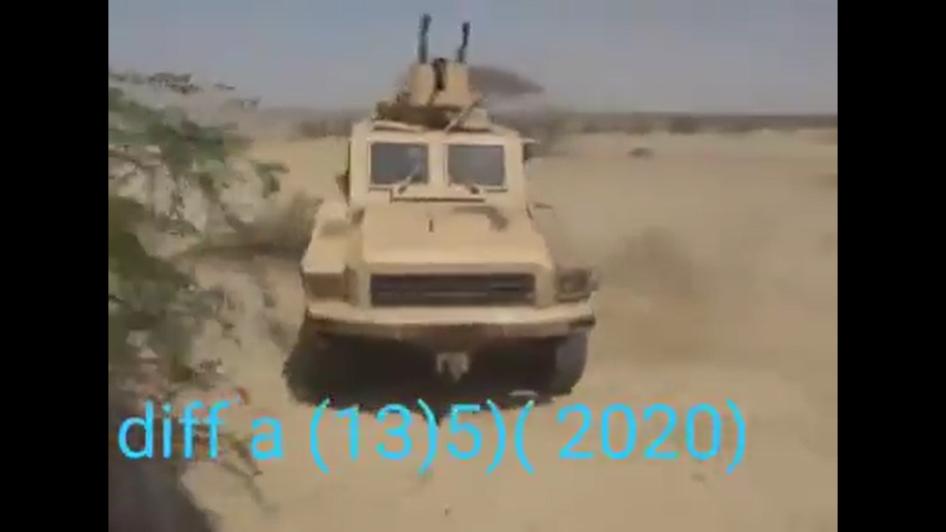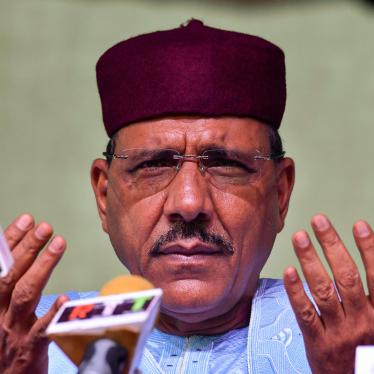A video from Niger shows government soldiers in a military vehicle running over and killing two alleged Boko Haram fighters who appear unarmed and wounded, Human Rights Watch said today.
The video, which the Niger government confirmed is from the country, was filmed during a military operation against Boko Haram on May 11, 2020, south of Diffa in southeastern Niger, near the border with Nigeria. The video was widely circulated on social media and shared with Human Rights Watch.
“The graphic video shows Niger soldiers in armored vehicles shooting and driving over apparently unarmed and wounded men,” said Jonathan Pedneault, crisis and conflict researcher at Human Rights Watch. “This ghastly incident involving 10-ton trucks requires a credible and impartial investigation, with appropriate accountability for wrongdoing.”
The video, which was recorded by a soldier on the vehicle, shows three US-manufactured Mamba MK7 armored vehicles operated by Nigerien troops driving past an overturned vehicle on fire and running over a prone man prior to chasing and shooting another. Once the second man is hit and falls to the ground, two Mamba MK7 vehicles run over him. A soldier aboard one vehicle is heard cheering. A soldier is then heard saying, “Stop, he has fallen, he is dead.”
The incident happened during a two-day military operation south of Diffa, reportedly led by Niger’s Special Intervention Battalion. While Human Rights Watch could not determine the precise location based on the video alone, the geographic features seen on the footage match the region’s landscape at this time of the year. The government said that it killed 25 members of Boko Haram south of Diffa on May 11. On May 3, the armed Islamist group had attacked government troops south of Diffa, reportedly killing three to five soldiers.
For several years, Islamist armed groups have carried out attacks on Niger’s western and southeastern borders. In early May, Boko Haram significantly increased its attacks on government forces in the Diffa area. Over the past six months, groups affiliated with the Islamic State in the Greater Sahara (ISGS) have also attacked government forces, killing dozens of soldiers in the Tillaberi area, north of the capital, Niamey. The media reported on May 9 that unidentified gunmen killed 20 civilians in Anzourou department, Tillaberi region.
A person who investigated the May 11 incident, but does not wish to be named for fear of retaliation, said that military authorities in Diffa told him the men were Boko Haram fighters and justified running them over because they wore protective talismans that allegedly made them impervious to bullets.
A senior government official with knowledge of the incident told Human Rights Watch that those killed were senior members of Boko Haram who had been involved in the earlier killing of an army lieutenant at an outpost south of Diffa. He said the soldiers in the video were subordinates of the deceased lieutenant who wanted to avenge his death, and that the Niger army “should not be judged based on that incident alone.”
“They did it to send a message to Boko Haram – you killed our lieutenant, we will kill yours,” the government official said. “One shouldn’t expect a military tribunal to convict these guys for having killed Boko Haram members."
In a June 8 letter to Human Rights Watch that followed a request for information sent on May 22, Niger’s minister of foreign affairs, Kalla Ankourao, responding only to the killing of one of the two individuals visible in the video, wrote that the man was wearing a suicide belt and that he had not raised his hands to surrender, making him a legitimate military target. He added that “The armored vehicle used in the maneuver had no other objective than to protect the soldiers should the explosive charge be detonated.”
Human Rights Watch’s review of the video could not ascertain whether the individual was wearing a suicide belt. We note that previous statements by officials made no such claim. It is evident from the video that the man said to be wearing a suicide belt was on the ground and apparently wounded and immobilized. Had he been wearing a suicide belt that posed a danger to the soldiers, the more likely response would have been to incapacitate him from a safe distance, such as with small arms, rather than create a substantial risk of harm to the vehicle and the exposed soldiers by running over him.
Common Article 3 to the Geneva Conventions of 1949, which is applicable to the armed conflict between Niger and Boko Haram, prohibits attacks on “[p]ersons taking no active part in the hostilities, including members of armed forces who have laid down their arms and those placed hors de combat by … wounds.” The deliberate killing of such individuals is a war crime. In the video, the men killed appear to be either wounded fighters no longer taking part in hostilities or civilians protected from attack.
Niger is a member of both the G5-Sahel, a group of Sahel states engaged in counterterrorism operations, and the Multinational Joint Task Force (MNJTF), which coordinates the Lake Chad states’ operations against Boko Haram. It receives significant military and financial aid from France, the European Union, and the United States. In December 2019, the United States provided 13 Mamba MK7 armored vehicles like the ones seen in the video as part of a US $21 million donation to Niger. In 2014, Niger bought six Mamba MK7 from South Africa.
The source of the Mamba MK7s used in the May 11 incident is unclear, but both the US and South Africa should take measures to ensure that equipment they provide is used in accordance with the laws of war, Human Rights Watch said.
The government of Niger should immediately announce the opening of a judicial investigation into the May 11 incident and hold those responsible for unlawful killings to account. It should do so transparently and issue clear instructions to its forces to prevent the recurrence of such violations, which have also allegedly happened elsewhere in the country in recent months.
On April 30, a report from the United Nations peacekeeping mission in Mali (MINUSMA) found that Nigerien forces had apparently executed 34 people inside Mali in late February and early March. Forces participating in the G5-Sahel can pursue individuals suspected of belonging to armed Islamist groups in neighboring countries, within 100 kilometers of their borders, but all operations must be conducted in accordance with the law.
Niger’s international partners should urge the regions’ governments to investigate allegations of abuses by their security forces and hold those responsible for violations accountable. They should ensure that any military assistance and exports provided to its security forces is not being used by units responsible for violations of international human rights or humanitarian law for which no one has been held to account. In UN Security Council meetings on the Sahel, Niger, which currently sits on the council, should welcome and encourage such discussions.
“All governments providing military aid to Niger and other governments in the Sahel should use their leverage to press their forces to respect human rights and the laws of war, and hold those responsible for abuses to account,” Pedneault said. “Impunity for war crimes and other abuses by armed forces only leads to greater disregard for the rule of law by soldiers and could reinforce local grievances against the state and encourage recruitment into armed groups.”






